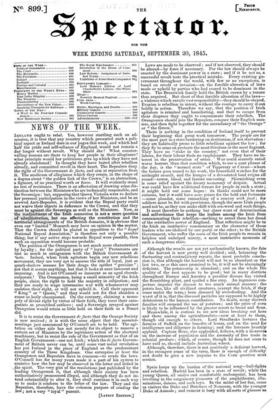NEWS OF THE WEEK.
IRELAND ought to rebel. Yes, however startling such an ad- mission, it is true that any country which presented such a poli- tical aspect as Ireland does in our pages this week, and which had half the pride and self-reliance of England, would not remain a day longer without revolt. Why should she ? What counter- vailing reasons are there to keep her people in their allegiance? what principle would her politicians give up which they have not already abandoned? In thought they have lusted after rebellion already, and committed revolt in their heart. The Repealers deny the right of the Government de facto, and aim at separation from it. The modicum of allegiance which they retain, in the shape of a dogma about "the golden link of the Crown," is an abstraction, a figment, of no practical worth or force. It will evidently stand no test of resistance. There is an affectation of drawing some dis- tinction between the Ministers who are technically responsible, and the Sovereign: butt supposing that Queen Victoria were to declare her personal participation in the views of her Ministers, and be an avowed Anti-Repealer, it is evident that the Repeal party could not waive their objects in deference to the Crown, and that they must be against the Sovereign as well as the Ministers. Now, as the readjustment of the Irish connexion is not a mere question of administration, but one affecting the constitution and the territorial arrangements of the British domains, it is obvious that even our "limited" Monarch may have an opinion in the matter. That the Crown should be placed in opposition to the "Loyal National Repeal Association," is therefore not only a possible thing, but if any active steps towards Repeal were possible, then such an opposition would become probable.
The position of the Orangemen is not much more characterized
by loyalty ; for the political party of " loyal " Protestants are lust as much in antagonism with the British Government de 'Pada. Indeed, when Irish agitators begin any new rebellious movement, they are very apt to assume the title of loyal, just as quack-doctors assume for their drugs the epithet " genuine " ; not that it means anything, but that it looks at once innocent and imposing. And is not O'Connell as innocent as an aged cherub- corporate ? The Orangemen, being a small minority of the Irish people, claim the right to hold the majority in subjection ; and they are ready to wage internecine war with whomsoever may question their right, or will not uphold it. Call their opponent ' King" or " Queen," and they would not for that abandon a cause so hotly championed. On the contrary, claiming a mono- poly of divine right by virtue of their faith, they treat their anta- gonists as proscribed outlaws ; and a Sovereign arrayed against Orangeism would retain as little hold on their faith as a Stuart did.
It is to resist the Government de facto that the Orange Society is now revived ; it is with the same object that the monster- meetings just announced by O'Connell are to be held. The agi- tation on either side has not merely for its object to remove a certain set of Ministers by the legitimate action of the electoral machinery, but to resist the rule of the Government as that of an English Government—one not Irish ; which the de facto Govern- ment of Britain never can be, until some vast social revolution has put Ireland in the place of England as the predominant country of the Three Kingdoms. One enterprise at least the Orangemen and Repealers have in common—to evade the laws. O'Connell has for many years made it a part of his system to contrive how the law may be observed in the letter and defied in
he spirit. The very gist of the resolutions just published by the
leading Orangemen is, that although their society has been authoritatively pronounced illegal, and although they do not in- tend substantially to alter it, they shall continue it in such way as to make it conform to the letter of the law. They and the Repealers, therefore, have the common purpose of evading the
, law; not a very "loyal " pursuit.


























